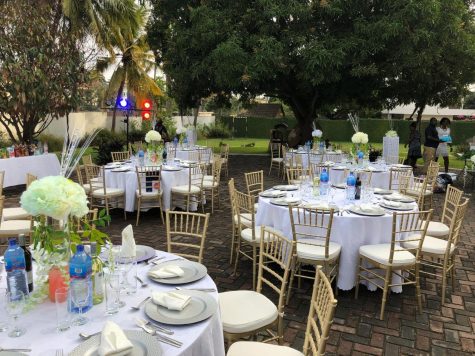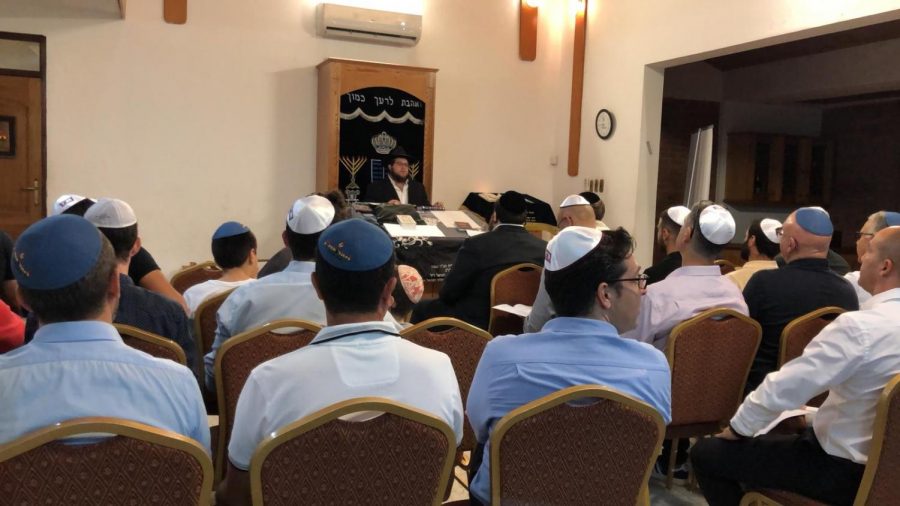Retaining Faith While Abroad
SPS sophomore Arik Rosenstein goes to the synagogue every Friday and Saturday in Accra, Ghana as part of his religious practices.

When SPS sophomore Arik Rosenstein was considering where to study abroad this fall, he knew two things: he wanted to understand how soccer influences the lives of people in another country and he wanted to keep up with his Jewish faith no matter where he was.
Rosenstein ultimately chose to spend a semester at NYU Accra, the university’s smallest global site. While he had looked forward to the experience, he was worried about maintaining his religious practices while there. However, he said he knew that a sect of Hasidic Judaism called Chabad sends young Jewish couples all over the world to be a resource for the Jewish community in a country. Luckily, he saw that there was a synagogue right in Accra and reached out to the rabbi.
“I mean, there were definitely challenges and things that I keep in New York that I don’t keep here,” Rosenstein said. “It’s definitely not as simple, but I also knew the resources before I came here, that there was a synagogue and that I could go to them and use them … to be able to fulfill my spiritual and mental needs and things like that.”
While he said he wouldn’t consider himself to be very religious, he does practice certain parts of Judaism. He keeps the Sabbath every week, during which he goes to the synagogue from Friday at sundown to Saturday at sundown.
“It’s actually very nice,” Rosenstein said. “It’s very calm and quiet. Most people that are here… are different types of observants. They wouldn’t necessarily keep the Sabbath, which is every Friday night to Saturday, where you don’t touch electronics or write or use anything that is considered work, so it’s a lot of reading and sleeping and eating and relaxing.”
NYU Accra’s meal plan provides dinner to students every weeknight, and Rosenstein is able to keep kosher via separate meals prepared for him on weekdays he does not go to the synagogue. This often means he does not eat meat unless he goes to the synagogue, where his rabbi prepares the animals according to Jewish custom.
Rosenstein said the Jewish community in Accra is filled with many expats, especially from Israel — who work in the city — as well as several students this semester.
“You get lots of interesting people,” Rosenstein said. “Everybody that walks in there has a story, which is kind of cool to experience every Friday.”
However, while Rosenstein has several resources and accommodations that allow him to practice his faith in Ghana, he said it is not always easy because he misses out on weekend trips provided by the school. Furthermore, several Jewish holidays took place in September, and Rosenstein missed nine classes.
He said it puts him at a disadvantage because he needs to catch up on work and maintain his academic standing. Still, he believes the negative aspects of it are worth it.
“With certain things, it puts my fellow classmates at a disadvantage because sometimes there are group projects, and you’re not able to help because you literally cannot be there,” Rosenstein said. “So it’s not easy, but it is meaningful. It’s not easy, and it’s not convenient to serve what I believe in, but when I do it, I’m doing it with my whole heart. And that’s something I’m happy about — that I get to experience that and I’m happy that I’m able to fulfill what my beliefs are here especially.”
Rosenstein said he would recommend studying abroad in Accra to Jewish students in the future, and he is excited to represent NYU Accra when he returns to the Washington Square campus in the spring.
“I think, you know, just because you’re Jewish or Muslim or Christian or any other religion, nothing in this world should inhibit you,” Rosenstein said. “There’s nothing that should stop you, and the staff here have been so welcoming. My friends here have been so understanding, and everybody just respects you for who you are — especially in Ghana. Everybody doesn’t ask twice about religion. It’s you and your personal beliefs, and that was something really surprising. I definitely will recommend it when I get back to campus.”
A version of this article appeared in the Monday, Oct. 1 print edition. Email Natasha Roy at [email protected].
Natasha is a CAS sophomore studying journalism and public policy, and she's an editor-at-large at WSN this semester. Originally from a small town outside...























































































































































